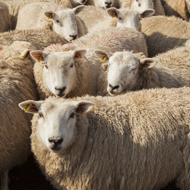Somerset police issue warning over sheep thefts

"There is no guarantee that the animals will be fit, healthy and dealt with correctly if they are arriving into people's freezers via illegitimate channels."
Somerset police are warning that stolen animals may are getting into the food chain, following a spate of sheep thefts in the area.
Over the past two weeks, the Rural Crime Team says there has been a "dramatic" increase in sheep thefts, with six incidents in a short space of time.
Thefts have occurred in Chinnock, Mark, South Petherton, Ilminster and Long Sutton. Between 24-25 July, 240 sheep were stolen from a field in Langport overnight. Pigs and geese have also been stolen.
Not only do the thefts have a serious long-term impact on individual farmers and smallholders, PC Katy Drabble from the Rural Crime Team said it could mean stolen animals are getting into the food chain.
"Farmers raise their animals, transport and slaughter them according to strict guidelines, which thieves are not necessarily going to adhere to," she explained. "There is no guarantee that the animals will be fit, healthy and dealt with correctly if they are arriving into people's freezers via illegitimate channels."
PC Drabble urged those buying livestock to check the provenance and documentation of the animals. Members of the public were also urged to be vigilant.
"If someone is offering you animals/butchery products for a price that seems to good to be true, then it probably is. Don't create a market in which thieves can operate. Buying stolen property is an offence."
In order to protect their stock, farmers are advised to ensure animals are tagged, keep gates and doors locked and in good condition, avoid leaving keys in vehicles and put something heavy in front of gates, although trailers or anything that could be used to transport sheep should not be left.
Farmers can also join the FarmWatch scheme, which allows police to quickly share information with the farming community.
Police investigations regarding the thefts are ongoing and Somerset communities are being asked to report sightings of people in fields or with vehicles containing livestock overnight.



 The Veterinary Medicines Directorate (VMD) is inviting applications from veterinary students to attend a one-week extramural studies (EMS) placement in July 2026.
The Veterinary Medicines Directorate (VMD) is inviting applications from veterinary students to attend a one-week extramural studies (EMS) placement in July 2026.